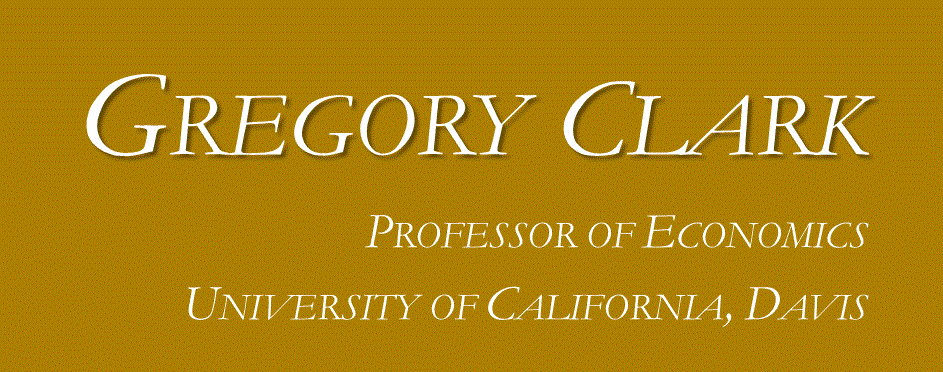  |
| http://www.masterworksfineart.com/inventory/2847 |
 WELCOME
WELCOME
I am a
Professor of Economics at UC-Davis, an editor of the European
Review of Economic History, chair of the
steering committee of the All-UC Group in Economic
History, and a Research Associate of the Center for Poverty
Research at Davis > http://www.econ.ucdavis.edu/faculty/gclark/
'There is no American Dream': Why one US professor believes the national ethos is an illusion and the country has the same level of social mobility as medieval England
- Gregory Clark, of UC Davis, claims American dream is simply an illusion
- Instead, social mobility in U.S. is no higher than in rest of world, he says
- Disadvantaged citizens 'will not be granted opportunities for hard work'
- They will remain stuck in social status for life - and so will their children
- Mr Clark's findings were obtained using figures from the past 100 years
- But his students disagree, saying parents' wealth is not 'deciding factor'
My main current research is on the history and nature of
social mobility, investigated using the status information
content of surnames and its rate of change over time. Using such
methods we can estimate rates of social mobility as early
as 1300 for England, and 1700 for Sweden. But I still also
study long run economic growth, the wealth of nations,
with particular focus on the economic history of England
and India.
I
teach undergraduate and graduate World Economic History,
and help organize the economic history seminar. We
have one of the strongest groups of economic historians in
the world here. If you are interested in Economic
History at Davis check the web sites of my colleagues
Peter Lindert, Chris Meissner, Alan Olmstead, and Alan
Taylor.
I grew
up in Scotland, where one of my contemporaries at Holy
Cross High, Hamilton, was Donnie Burns, 14-time World
Professional Latin American Dance Champion. My
grandfathers came from Ireland to work in the coal mines
and steel mills of the Clyde Valley, as part of the great
diaspora of the Irish triggered by Ireland’s failure to
industrialize in the nineteenth century.
My
path from the rain of the West of Scotland to the sunshine
of California was by way of degrees at King’s College,
Cambridge, and Harvard, and faculty positions at Stanford
and Michigan.
My office is 1137 Social Sciences and Humanities Building. To contact me stop by, call 530-574-7188, or send an e-mail.~Office: SSH Room 1137, Phone: 530-574-7188, E-mail: gclark@ucdavis.edu
[Sidebar: The Internet is the missing mystery of the future history that has yet to be -- and yet has already been, 1967 and, Magritte, Rene, Le fils de l'homme (The Son of Man), 1967, Series 2
Professor Gregory needs a visual fine artist 'cartoon' level of Rembrandt, Delacroix, Donald and Ryan Wilson, also on FACEBOOK<
Hi Story Is a Delusional Distress Ongoing Roman Army USA
ReplyDelete